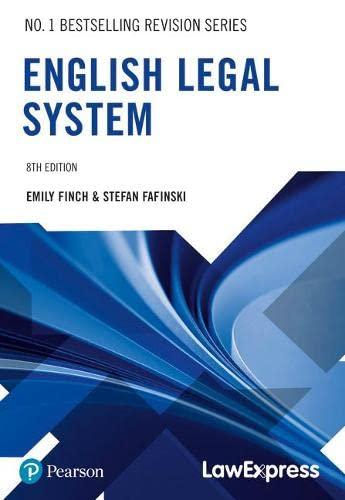Question
After reading the WSJ article (linked below), respond to the question(s) that follow. The required length for responses is a minimum of 200 words per
After reading the WSJ article (linked below), respond to the question(s) that follow. The required length for responses is a minimum of 200 words per question.
- Sanford Wadler, a corporate attorney, blew the whistle on his company for bribery. Discuss the opposing positions of Bio-Rad and the Securities and Exchange Commission regarding his use of attorney-client privileged information in his action. Feel free to address any potential justifications for blowing the whistle that you learned about in the textbook.
- Your company does business in a foreign land, and it becomes apparent that, under their societal norms, bribery is the way to get ahead. Does that make it permissible? You may draw on the textbook and bring in any legislation that would apply.
Trial Reveals Pitfalls of Whistleblower Claims From In-House Corporate Lawyers
Sanford Wadler to use sensitive material from Bio-Rad Laboratories as evidence in lawsuit Gift unlocked article Bio-Rad Laboratories Inc., shown here, is being sued by its former general counsel over his termination in June 2013.
A trial set to begin Tuesday in San Francisco will put on rare public display sensitive material entrusted to an in-house corporate lawyer, sending a cautionary note to companies facing whistleblower claims from their own counsel.
The trial stems from a wrongful-termination lawsuit filed in federal court in 2015 bySanford Wadler, the former general counsel of life-sciences research company Bio-Rad LaboratoriesInc.BIO-5.81%decrease; red down pointing triangle
The 25-year Bio-Rad veteran says he was fired for blowing the whistle on what he said were signs that the publicly traded company had possibly engaged in bribery in China.
Bio-Rad says he was fired for legitimate reasons, including botching securities filings and failing to detect bribery in three other countries that ledthe company to pay a $55 million fine to the U.S. government.
Now, a jury will decide whether Mr. Wadler's claims have merit and in the process review internal company information that Bio-Rad unsuccessfully sought to keep under seal.
An attorney for Bio-Rad declined to comment ahead of the trial. Attorneys for Mr. Wadler didn't respond to requests for comment.
The case is the latest example of in-house lawyers and compliance officers claiming retaliation for blowing the whistle on their own employers. Such cases raise complicated questions about whether information given under the guise of attorney-client privilege can or should be divulged. They also challenge companies to improve their internal processes to prevent cases from spilling into public view.
Mr. Wadler alleges in his suit that his firing in June 2013 violated the Dodd-Frank and Sarbanes-Oxley acts, which shield whistleblowers from retaliation.
Bio-Rad asked a judge late last year to bar its former top lawyer from using information he learned in his capacity as general counsel to support his case, arguing it would violate California attorney ethics rules. The state's rules require lawyers to keep client information confidential unless something they learn could threaten a person's life.
The Securities and Exchange Commission weighed in against Bio-Rad,arguing in a court filing that attorneys are often crucial whistleblowersand should be allowed to use company information in retaliation cases.
U.S. Magistrate JudgeJoseph Speroruled in December that the federal whistleblower laws trump state ethics rules and that Mr. Wadler can use privileged information that is "reasonably necessary to any claim or defense in the case."
The trial, which is expected to last about three weeks, has been the chatter of in-house lawyers.
The case pits "the right of an individual to be encouraged to be a whistleblower and be protected...versus the right for a client, in this case the corporate entity, to be able to control and expect confidentiality," saidMarla Persky, a former in-house lawyer at pharmaceutical companies including
Baxter International
Inc.
Finding the right balance between the two can be difficult, saidAmar Sarwal, vice president and chief legal strategist at industry trade group the Association of Corporate Counsel.
"If you want a true culture of compliance, you need to have some sense of independence for the attorney," Mr. Sarwal said. "If the attorney feels a threat of retaliation, they're less likely to do what needs to be done."
In his May 2015 lawsuit, Mr. Wadler said he raised the possibility of corruption in China after learning that the company had engaged in bribery in Russia, Thailand and Vietnam. He said the company wanted him to turn a blind eye to the alleged further misconduct and fired him after he raised concerns to Bio-Rad's audit committee.
In a November court filing, Bio-Rad said Mr. Wadler put the company at risk by failing to learn about the federal law that covers foreign bribery or to create a compliance program, even after the Justice Department began aggressively rooting out bribery at public companies in the early 2000s.
Once the company faced the fine related to bribery in Russia, Thailand and Vietnam, Bio-Rad said in the filing, Mr. Wadler looked for further evidence of corruption where there was none to justify his existence. Bio-Rad said it could never substantiate the China claims and that Mr. Wadler became erratic, creating such a toxic environment that it fired him.
Advertisement
Step by Step Solution
There are 3 Steps involved in it
Step: 1

Get Instant Access to Expert-Tailored Solutions
See step-by-step solutions with expert insights and AI powered tools for academic success
Step: 2

Step: 3

Ace Your Homework with AI
Get the answers you need in no time with our AI-driven, step-by-step assistance
Get Started


